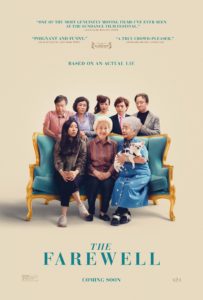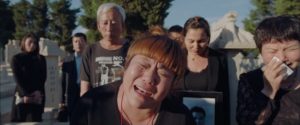For Verona Lou Collier
“If the dead are not raised, ‘Let us eat and drink, for tomorrow we die.’” -1 Corinthians 15:32
 Lulu Wang’s The Farewell (2019) opens with a joke about how to tell a woman that her cat is dead. The punchline, or the lack thereof, illustrates how there is never a good way to tell someone about death. This bit of dark humor establishes the tone of the black comedy that is to follow and introduces the theme that life is both a tragedy and a comedy. As I look back on not just 2019 but the decade preceding, I am overwhelmed by how much this period of my life was marked by grieving and loss. I suppose it is only fitting then that the film that resonated with me most this year was one poignant with the notion of lamenting.
Lulu Wang’s The Farewell (2019) opens with a joke about how to tell a woman that her cat is dead. The punchline, or the lack thereof, illustrates how there is never a good way to tell someone about death. This bit of dark humor establishes the tone of the black comedy that is to follow and introduces the theme that life is both a tragedy and a comedy. As I look back on not just 2019 but the decade preceding, I am overwhelmed by how much this period of my life was marked by grieving and loss. I suppose it is only fitting then that the film that resonated with me most this year was one poignant with the notion of lamenting.
Entering 2010, my oldest daughter, Karis, had recently been diagnosed with Early Infantile Krabbe, a rare form of leukodystrophy that usually results in death by age two. I was alternating between stages of shock, anger, depression, and guilt (the disease is genetic, so, my hurting brain reasoned, I must be to blame). I was seeking a way to process and inhabit my grief. Dialoguing with others, I found a strange occurrence. In an effort to exercise empathy, there were many who would seek to recreate early experiences of grief through tears or anger. In many cases, I found myself avoiding such individuals, because I knew of the emotional toil it would take to have to relive the trauma again with them. After some reflection, I realize that they were, in the best way they knew how, aiming to co-opt some of the sadness for me. For all our individualism and privacy, the West still needs some kind of collective grieving.
What makes The Farewell so compelling and engrossing is that it asks the question of how we as a culture should mourn and then it purposefully does not answer it. In fact, it presents two competing versions of processing death and causes the audience to re-examine their own assumptions. The premise is that Chinese-born, US-raised Billi (Awkwafina) returns to her native country to discover that while the matriarch, Nai-Nai (Zhao Shuzhen), has been given a prognosis of a few weeks to live, the family has decided not to tell her. In order to ensure her happiness in her remaining time, relatives reunite under the ruse of an expedited wedding. Navigating cultural expectations and the emotional dilemma of being complicit in such a good lie, Billi grapples with a perspective on death that is antithetical to the Western one in which she normally traffics. The communal, societal view of life in the East communicates in a different way than the individualistic one of America. Thus, the fact that Billi’s father is a translator is a metaphor to how language shapes our thinking about fundamental matters and alludes to all that is lost in any kind of translation.
The Farewell is in many senses about miscommunication and misunderstanding. We cannot convey a person to another person. Thus, when a person dies, it is the loss not only of that individual but also of the people they knew who we never met. I was reminded of this in 2018 when my last surviving grandmother died. My mom mentioned how there were so many questions she wanted to ask her and not just about my grandmother’s life. With the death of my grandmother, there was the loss of a whole generation of narratives. Entire lives that we could access through speaking to her were now severed from us. Thus, when you grieve a person, you grieve a family.
 For Billi’s family, they are convinced that keeping the truth of her condition from her is a way of loving her, what they call a good lie. One of the most profound statements comes from Nai-Nai’s oldest son when he says, “We are bearing this emotional burden for her.” Symbolically, the recurring motif of the bird suggests not only the fleeting nature of life but how some messages must be carried away from a person for their protection. Further, such a statement makes me think of another scene where the family was in the cemetery paying respects to Nai-Nai’s late husband. In the distance, there was a procession of professional mourners, which reminded me of those well-meaning persons who re-enacted my pain about Karis in front of me. I suppose in any culture some of what makes us human is our need to share sorrows.
For Billi’s family, they are convinced that keeping the truth of her condition from her is a way of loving her, what they call a good lie. One of the most profound statements comes from Nai-Nai’s oldest son when he says, “We are bearing this emotional burden for her.” Symbolically, the recurring motif of the bird suggests not only the fleeting nature of life but how some messages must be carried away from a person for their protection. Further, such a statement makes me think of another scene where the family was in the cemetery paying respects to Nai-Nai’s late husband. In the distance, there was a procession of professional mourners, which reminded me of those well-meaning persons who re-enacted my pain about Karis in front of me. I suppose in any culture some of what makes us human is our need to share sorrows.
In 2011, I struggled with my second major episode of depression. I was sidelined by the darkness and crippled in a way that felt like a death. For fellow sufferers, you can relate to the physical pain and inertia that accompanies such a state. I could not see a terminus to my constant state of misery. The state of hurting became so prevalent that I started identifying with it. However, I not only identified with it, but I identified with it and then resisted it. When a therapist pointed it out as such, I was able to accept the depression as I felt it overcoming me. I wish I could say that this was the precursor to me recovering. I am not sure that it was, because inexplicably the depression left in December of 2012.
Billi seems to take an analogous approach when she first learns of her grandmother’s illness. She not only thinks Nai-Nai should know, because it is wrong to keep the truth from her but also because she thinks that her grandmother should be informed of the treatment options. Billi refuses to accept that someone could submit to a prognosis without looking for solutions. Further, the idea that the family engage in not only collective deceit but also faux-celebration by hosting a wedding of Billi’s cousin Hao. Hao (Han Chen) and the metaphorically significant, somewhat silent fiancee Aiko (Aoi Mizuhara) is offensive to our protagonist. Nevertheless, the nuptials go forward while all in attendance must hide their grief.
 Since the setting is a wedding with a figurative funeral lurking, I could not help but think of a recent video I saw between Stephen Colbert and Anderson Cooper. The two were discussing their personal losses and Colbert, quoting Tolkien, says, “Which of God’s judgments are not also gifts?” Reality is both a wedding and a funeral, and the strangeness of the ceremony of Christ is that he is wedded over a casket. The wedding and the funeral meet in the cross of Christ. To deny one of these elements is to drift either into nihilism or hedonism. Thus, faced with such unspoken grief, it is no wonder that one of the individuals giving the toast almost paraphrases Paul in 1 Corinthians 15, saying, “Let us eat, drink, and be merry.”
Since the setting is a wedding with a figurative funeral lurking, I could not help but think of a recent video I saw between Stephen Colbert and Anderson Cooper. The two were discussing their personal losses and Colbert, quoting Tolkien, says, “Which of God’s judgments are not also gifts?” Reality is both a wedding and a funeral, and the strangeness of the ceremony of Christ is that he is wedded over a casket. The wedding and the funeral meet in the cross of Christ. To deny one of these elements is to drift either into nihilism or hedonism. Thus, faced with such unspoken grief, it is no wonder that one of the individuals giving the toast almost paraphrases Paul in 1 Corinthians 15, saying, “Let us eat, drink, and be merry.”
The film does offer criticism to the Eastern view of death as well though. One of the more powerful moments of the film was when Billi talks about her grandfather and catching fireflies with him and then, since the mother never told Billi he was sick and she could not process her grief, she felt as if he vanished. The fireflies are a great metaphor for the fleeting, ephemeral nature of existence. The struggle is to catch them, then their light goes dark, and they are dead in the morning. Suppressed grief or undiscussed loss circumvents the kind of grief processing that is healing. Individual lamenting is as necessary as group or collective mourning. We see the need to let go of toxic emotions when Nai-Nai shows Billi a breathing technique and exercise for releasing those feelings.
2016 was bookended for me by loss. At the beginning of the year, I encountered my last major episode of depression and finally received treatment for my OCD. It was a time of sorrow but also one of progress as I was being given therapeutic tools for addressing my underlying emotional pain. Much of my healing came through communal lament, what in psychological circles has come to be termed as group therapy. Through an outpatient program called Three Oaks, I processed my hurt and loss among others who were suffering. It was through that kind of therapeutic experience that I was able to see the power of grieving with others and how the tendencies of my OCD, the ruminating thoughts and the compulsive thinking, severed me from such experiences.
 After recovering and returning to work, I learned three months later that my wife had left. The intense pain and disruption of divorce that marked 2016 and 2017 further led me to characterize and identify myself through my suffering. While undergoing the ostracizing effects of being a divorced man in the church, I felt the agonizing effects of alienation once again. I suppose what characterized both the suffering of my mental health and the suffering of my broken marriage was the sense of stigma. Not only was there a seclusion that intrinsically comes with having a wife leave, I began to perceive myself as a kind of leper among the community of the redeemed. My wounds were necrotizing because of my own proclivity to lament alone.
After recovering and returning to work, I learned three months later that my wife had left. The intense pain and disruption of divorce that marked 2016 and 2017 further led me to characterize and identify myself through my suffering. While undergoing the ostracizing effects of being a divorced man in the church, I felt the agonizing effects of alienation once again. I suppose what characterized both the suffering of my mental health and the suffering of my broken marriage was the sense of stigma. Not only was there a seclusion that intrinsically comes with having a wife leave, I began to perceive myself as a kind of leper among the community of the redeemed. My wounds were necrotizing because of my own proclivity to lament alone.
I remember distinctively when that changed. I was at a former church member’s house, where we had gathered for lunch one Sunday. Before eating, he asked me to pray. I was astonished. It may seem like a small gesture, but it was the first time since my divorce that I was being asked to pray, read Scripture, or speak in any kind of public way. As I breathed out what must have been feeble words, I felt as if I was releasing some long-stored toxins. By The Farewell’s end, Billi must have felt the same.
During this time, a friend of mine named Caleb Stallings introduced me to Grindhouse Theology. Before long, I was writing articles for them. Through my experience with the other contributors, I developed robust friendships across digital space with men like Blake, Ian, and Chris. Each of these individuals challenged me to be vulnerable and to give expression to my hurt in ways I had never dared to before. Their willingness to listen to my loss validated me, but it was in the exchange of our sufferings that I felt the most whole. The sadness was always accompanied by a mutual love of cinema. In our shared sorrow, I found that central to our lament was also a kind of distracting celebration. For Billi’s family, that came in the form of a wedding. For us, it was often discussions about our common love of a horror film. Our friendship was marked by identifying as both mourners and merrymakers. I like to think of life as what fellow friend and writer Caleb Stallings has called, “the happy sad.”
 For me, an actual wedding came in 2019 as I remarried and found a kind of repair that I did not think I would find in this life. The loss is not erased, and I am not under delusions that all grief is gone. As The Farewell also comments, life is a series of letting go. When that pain intensifies, I have the opportunity to experience that hurt both individually and communally instead of choosing one over the other. Furthermore, I am coming to understand that I do not have to identify only as a survivor or a sufferer. Looking through the lens of Lulu Wang’s movie, I am saying farewell to a decade of farewells and hello to the hope that I can live with as much zest as Nai-Nai does, even as her body hides a cancer.
For me, an actual wedding came in 2019 as I remarried and found a kind of repair that I did not think I would find in this life. The loss is not erased, and I am not under delusions that all grief is gone. As The Farewell also comments, life is a series of letting go. When that pain intensifies, I have the opportunity to experience that hurt both individually and communally instead of choosing one over the other. Furthermore, I am coming to understand that I do not have to identify only as a survivor or a sufferer. Looking through the lens of Lulu Wang’s movie, I am saying farewell to a decade of farewells and hello to the hope that I can live with as much zest as Nai-Nai does, even as her body hides a cancer.
And through the tragicomedy of the cross of Christ, I can bid adieu to the notion that life is one or another rather than a medley of mourning and reveling.
